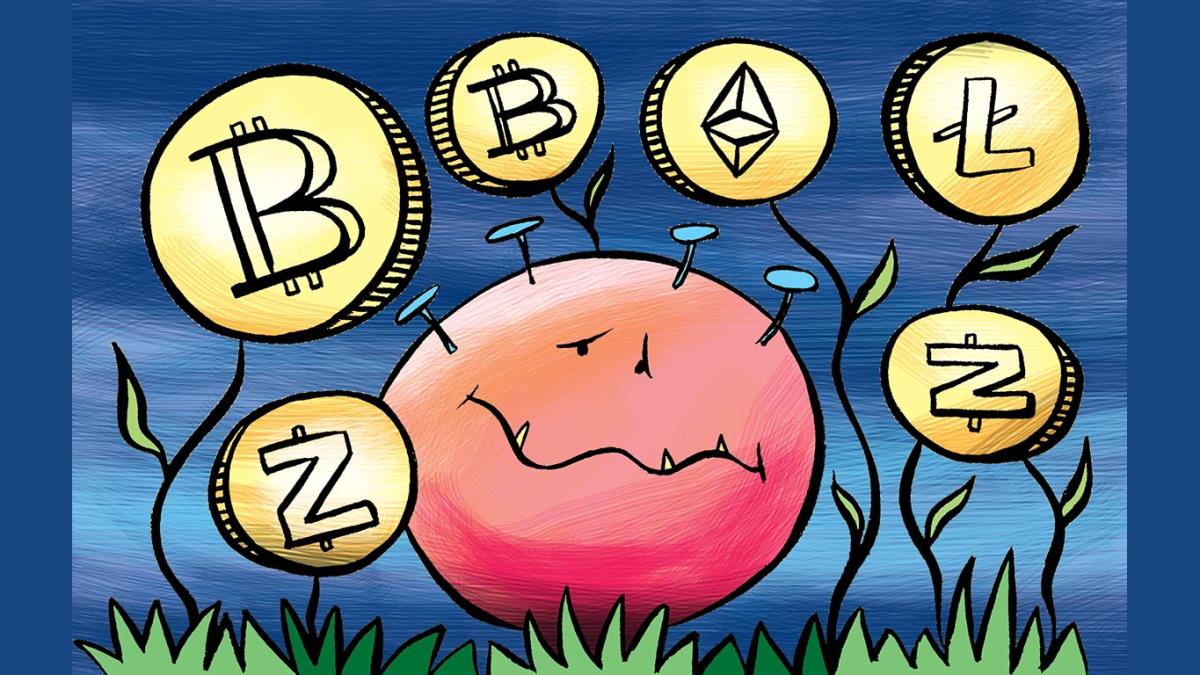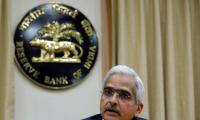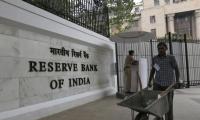Cryptocurrency Risks to Financial Stability: RBI Governor
RBI Governor Shantikanta Das warns of significant risks to financial stability posed by cryptocurrencies, highlighting concerns about central bank control over money supply and potential instability in the financial system.

Illustration: Uttam Ghosh/Rediff.com
Washington, Oct 26 (PTI) Cryptocurrencies are huge risks to financial stability, and monetary stability, Reserve Bank of India Governor Shantikanta Das said Friday, asserting it may create a situation where the central bank may lose control of money supply in the economy.
I am actually of the opinion that this is something which should not be allowed to dominate the financial system. Because it has huge financial stability risks, it has huge monetary stability risks, it also poses risks to the banking system. It also may create a situation where the central bank may lose control of money supply in the economy, RBI Governor Shantikanta Das said during his appearance at the Peterson Institute for International Economics, a think-tank.
If the central bank loses control of money supply in the economy, how does the central bank check liquidity available in the system? How does a central bank control inflation by squeezing money supply or by losing money supply in times of crisis? So, we see crypto as a big risk, and there has to be an international understanding because the transactions are cross-country, he said in response to a question.
There has to be (an) international understanding on this issue, being fully mindful of the huge risks associated with cryptocurrencies. It is not something which I feel it's not something which should be encouraged. This view is not a very popular view, but I think as custodians of financial stability, it is a major concern for central banks world over. Governments are also becoming increasingly aware of the possible downside risks in cryptocurrencies, Das said.
India, he said, was the first country to raise questions about cryptocurrencies. In the G20 under the Indian presidency, there was an agreement to develop an international understanding with regard to how to deal with this whole crypto ecosystem. Some progress has been made in this regard, he added.
I think more work still needs to be done. From India, from the Reserve Bank's perspective, I think we are one of the first central banks which very clearly voiced its serious concerns about the so-called cryptocurrencies. We see them as big risks, huge risks to financial stability. There are good reasons why we are saying that, he said.
First, we have to understand the origin of cryptocurrencies. The origin was to bypass the system. Cryptocurrencies have all the qualities of money. The fundamental question is, are we as authorities, are governments comfortable with privately issued cryptocurrencies which have all the features of Currency issuance. Currency issuance is a function, a sovereign function. So the bigger question, larger question is whether we are comfortable with crypto, which has characteristics of being a currency, or whether we are comfortable with having a private currency system in parallel to the fiat currency, he added.
Obviously, if a certain part of your economy is getting carved out and it is dominated by the crypto assets or the private crypto assets, then the central bank loses control over the entire monetary system. So therefore, it will lead to a huge amount of instability in the monetary system. It can also promote a huge amount of instability in the financial sector. So there are very big risks, he said.
So therefore, in India, we have been articulating that we have to deal with this very carefully. In fact, we have articulated that Countries of course, it will depend on individual countries taking their own decisions. But we feel that it has to be very strong, it is something which I think should be very cautiously and very carefully dealt with, Das said.
I am actually of the opinion that this is something which should not be allowed to dominate the financial system. Because it has huge financial stability risks, it has huge monetary stability risks, it also poses risks to the banking system. It also may create a situation where the central bank may lose control of money supply in the economy, RBI Governor Shantikanta Das said during his appearance at the Peterson Institute for International Economics, a think-tank.
If the central bank loses control of money supply in the economy, how does the central bank check liquidity available in the system? How does a central bank control inflation by squeezing money supply or by losing money supply in times of crisis? So, we see crypto as a big risk, and there has to be an international understanding because the transactions are cross-country, he said in response to a question.
There has to be (an) international understanding on this issue, being fully mindful of the huge risks associated with cryptocurrencies. It is not something which I feel it's not something which should be encouraged. This view is not a very popular view, but I think as custodians of financial stability, it is a major concern for central banks world over. Governments are also becoming increasingly aware of the possible downside risks in cryptocurrencies, Das said.
India, he said, was the first country to raise questions about cryptocurrencies. In the G20 under the Indian presidency, there was an agreement to develop an international understanding with regard to how to deal with this whole crypto ecosystem. Some progress has been made in this regard, he added.
I think more work still needs to be done. From India, from the Reserve Bank's perspective, I think we are one of the first central banks which very clearly voiced its serious concerns about the so-called cryptocurrencies. We see them as big risks, huge risks to financial stability. There are good reasons why we are saying that, he said.
First, we have to understand the origin of cryptocurrencies. The origin was to bypass the system. Cryptocurrencies have all the qualities of money. The fundamental question is, are we as authorities, are governments comfortable with privately issued cryptocurrencies which have all the features of Currency issuance. Currency issuance is a function, a sovereign function. So the bigger question, larger question is whether we are comfortable with crypto, which has characteristics of being a currency, or whether we are comfortable with having a private currency system in parallel to the fiat currency, he added.
Obviously, if a certain part of your economy is getting carved out and it is dominated by the crypto assets or the private crypto assets, then the central bank loses control over the entire monetary system. So therefore, it will lead to a huge amount of instability in the monetary system. It can also promote a huge amount of instability in the financial sector. So there are very big risks, he said.
So therefore, in India, we have been articulating that we have to deal with this very carefully. In fact, we have articulated that Countries of course, it will depend on individual countries taking their own decisions. But we feel that it has to be very strong, it is something which I think should be very cautiously and very carefully dealt with, Das said.
You May Like To Read
TODAY'S MOST TRADED COMPANIES
- Company Name
- Price
- Volume
- Vodafone-Idea-L
- 11.36 ( -2.49)
- 94664837
- AvanceTechnologies
- 1.16 (+ 4.50)
- 34522155
- Sunshine-Capital
- 0.26 ( -3.70)
- 29015901
- Alstone-Textiles
- 0.27 ( -3.57)
- 28695959
- Mehai-Technology
- 1.65 ( -4.62)
- 28262795






